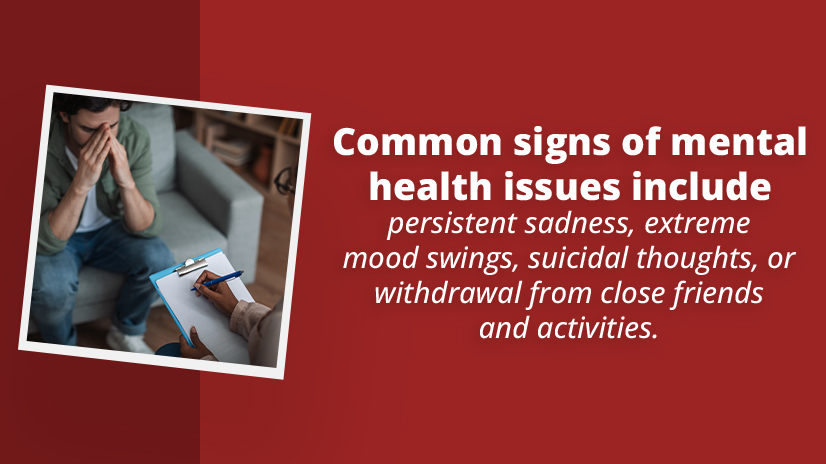
How Depression and Anxiety are Linked
Overcome depression and anxiety with personalized care at Indiana Center for Recovery. Find hope and healing today!

Mental health plays a vital role in overall well-being. Regular self-checks help us recognize early signs of stress or imbalance. By staying aware of our mental state, we can take proactive steps to maintain our health. This practice is essential for leading a balanced life.
While self-checks are important, expert help is often needed for deeper issues. Professionals can provide guidance and strategies tailored to individual needs. Continue reading the blog to learn about both self-assessment and seeking professional assistance for mental health.

Mental health is crucial for overall well-being, affecting our thoughts, emotions, and daily functioning. Here’s what you should know:
Indiana Center for Recovery offers various mental health services to help you recover from mental health issues. Call us at (844) 650-0064 for details.
Mental health refers to our emotional, psychological, and social well-being. It affects how we think, feel, and act in daily life. Good mental health helps us handle stress and make decisions. It also influences how we relate to others.
Mental health is crucial for overall well-being. It affects how we manage stress and interact with people. When we take care of our mental health, we feel more balanced and resilient, which helps us cope better with life’s challenges.
Understanding mental health helps reduce stigma and promotes support. Everyone needs to discuss mental health conditions openly. By prioritizing mental health, we improve our quality of life. This leads to healthier relationships and better personal growth.
Understanding when to seek help for mental health problems is crucial. If you feel overwhelmed, depressed, or anxious for a long time, it’s important to talk to a professional. Ignoring these feelings can lead to worsening psychotic symptoms. Seeking help early can lead to better outcomes and support.
Common signs of mental health issues include persistent sadness, extreme mood swings, suicidal thoughts, or withdrawal from close friends and activities. Changes in sleep patterns or appetite can also be indicators. If you notice these signs in yourself or others, it’s important to seek immediate help from medical professionals.
Self-assessment tools, such as questionnaires and mood-tracking apps, can help identify mental health concerns. Techniques like journaling or mindfulness can also provide insights into one’s mental state. Using these tools can help one understand one’s feelings and decide if one needs professional support.
Preparing to check yourself into a mental health facility can be a vital step towards recovery. It’s essential to understand your basic needs and know the differences between types of care. This process ensures you get the right support tailored to your situation, enhancing your path to better mental health.
First, think about what’s troubling you. Are you feeling depressed, anxious, or overwhelmed? List specific problems and their impact on your life. This will help you understand what type of help you need and communicate effectively with mental health professionals.
Look for local mental health facilities and services online. Check reviews and ratings to gauge their quality. Verify their accreditation and ensure they offer the type of mental health care you need. Contact them to inquire about their mental health services and their suitability for your needs.
There are various levels of care available. Inpatient care requires staying at a facility overnight. It’s for severe cases needing constant supervision. Outpatient care allows you to visit a facility during the day and return home at night. Choose based on how intense your needs are and your daily responsibilities.
The voluntary admission process for a mental health facility or mental hospital involves several important steps. It begins with preparing the necessary documents and understanding what to expect. Knowing the procedures can help reduce stress and make the transition smoother.
Before admission, collect your medical history and current medications. Contact the facility to arrange an assessment. Complete any required forms or evaluations. Prepare questions about the mental health treatment process and daily activities. Ensure personal identification and insurance details are ready.
During admission, you’ll meet with staff for an evaluation. They’ll review your treatment plan and discuss any specific needs. Expect to tour the facility or mental health hospital and receive an orientation. Be ready to provide your medical history and answer questions about your mental health.
Bring identification, a letter from the insurance company, and medical records. Include recent test results and medication lists. If required, obtain a referral from a healthcare provider. Make sure all documents are current and complete to facilitate a smooth admission process.
During your stay at a mental health facility, you’ll receive inpatient treatment. This helps individuals facing mental disorders. The staff ensures medication management and lifestyle changes to improve mental and physical health. Visits from family members play a significant role in the recovery process.
Patients follow structured schedules, which include therapy sessions, meals, and recreation. Daily routines focus on improving mental health and managing mental disorders. Support groups help patients cope with emotional distress. Activities like exercise enhance physical health.
Facilities offer various treatments for mental illness, such as individual and family therapy. Intensive care is provided for those having a mental breakdown. Medication management and support groups are common. Mental health therapy helps individuals find ways to handle a hard time.
During your hospital stay, work closely with mental health professionals. Communicate openly about your mental health crisis. Share all important things with them. The hospital staff is there to help you find the best option for your care. Your active participation can improve the outcome.
Psychiatrists manage medications during your mental health crisis. Psychologists offer therapy sessions to help you cope. Social workers assist with your hospital stay and aftercare plans. Nurses provide daily support and monitor your progress. Each professional plays a key role in your recovery.
Speak clearly and honestly with the hospital staff. Ask questions about your treatment and length of stay. Share your concerns and listen to their advice. Good communication ensures you receive the best care possible during your hospital stay. Always keep the conversation open and respectful.
Follow-up care is crucial after discharge from a mental health facility. Patients should attend all scheduled appointments with their therapists or psychiatrists. Regular check-ins help monitor progress and adjust treatments as needed.
Continuing treatment often involves medication and therapy. Patients must take their medication as prescribed and attend therapy sessions regularly. Therapists may use cognitive-behavioral techniques to help patients cope with stress. Consistency in treatment leads to better mental health outcomes.
Self-care is an essential part of ongoing treatment. Patients should practice healthy habits like regular exercise, balanced eating, and adequate sleep. Engaging in hobbies and interactive activities can improve mental health and reduce isolation. These habits support long-term cognitive health stability.
If you think you might have a mental illness, start by talking to your doctor. They can give you advice and refer you to a mental health specialist. A psychologist or psychiatrist can then assess your symptoms through discussions and tests. They will help you understand what you’re experiencing and suggest treatment options.
It’s important to be honest about what you’re feeling. Your specialist might ask questions about your thoughts, emotions, and behavior. Based on their assessment, they will provide a diagnosis and recommend ways to manage or treat your condition.
If you often feel overwhelmed, sad, or hopeless, it might be time to seek help. Notice if you struggle with daily tasks or if your emotions are hard to manage. If you experience constant anxiety or panic attacks, reaching out for support is wise. Additionally, if you have thoughts of harming yourself or others, immediate help is crucial.
Talk to someone if you find it difficult to connect with others or if you feel isolated. Difficulty focusing or making decisions can also be a sign. Professional help can provide support and strategies to cope with these challenges.
Prioritize your mental well-being with expert support. Whether you’re ready to perform a self-check or seeking professional guidance, Indiana Center for Recovery is here to help.
Our facility provides tailored mental health treatment options, including both outpatient and residential settings, to meet your unique needs. We also offer virtual care, which allows patients to receive top-tier rehabilitation services from the comfort of their own homes.
We offer various therapeutic services, including cognitive behavioral therapy (CBT), to effectively support your mental health needs.
Contact us today at (844) 650-0064 for more details and to take the first step toward a healthier, more balanced life. Your path to recovery begins here.